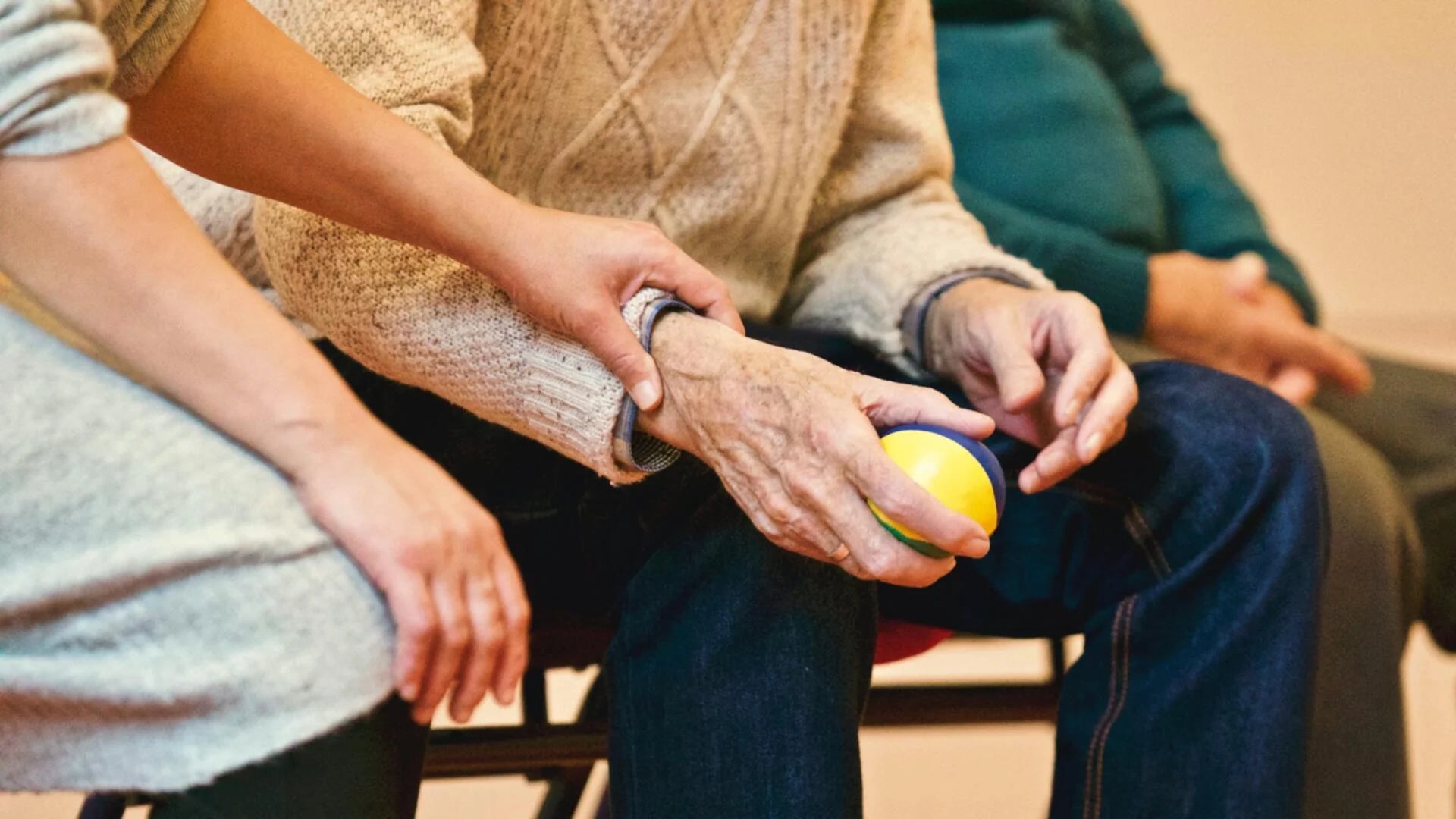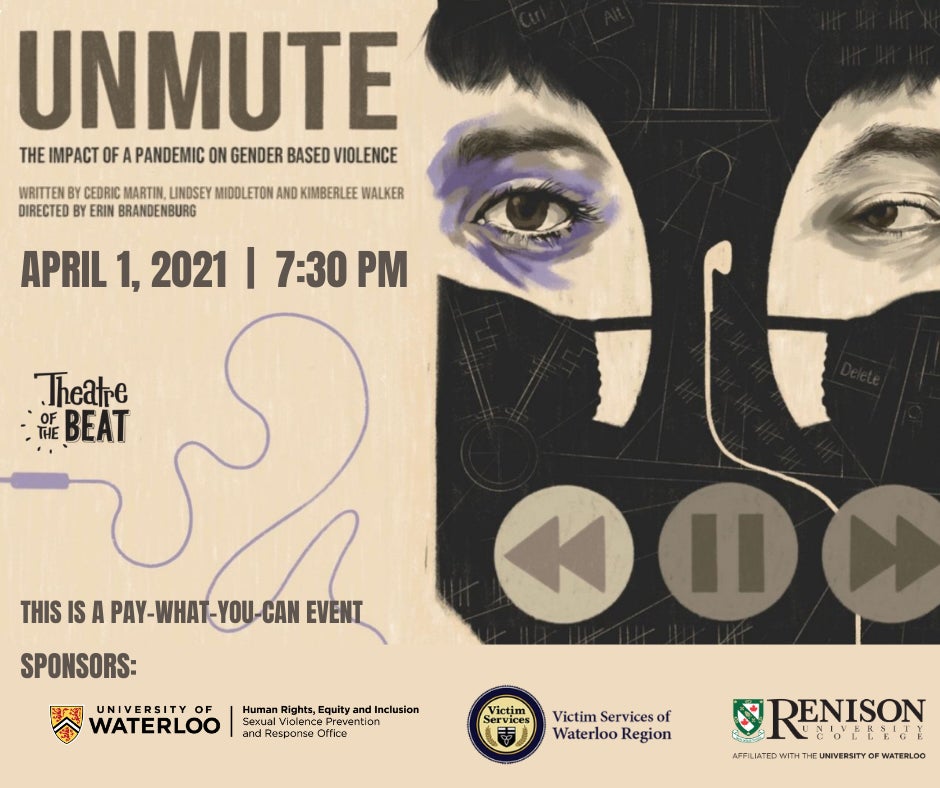Editor:
Brandon Sweet
University Communications
bulletin@uwaterloo.ca
Pandemic highlights importance of supports for people with dementia

By Heather Bean. This article was originally published on Waterloo News.
Laura Middleton became passionate about Alzheimer’s research after a much-loved aunt was diagnosed with early-onset Alzheimer’s at age 47.

“Her daughters were 12, 14 and 16, and she was my mom’s best friend, so it had a huge impact on our family,” says Middleton, a Kinesiology professor in the Faculty of Health. “I was interested initially in strategies to help reduce the risk of developing dementia. But gradually, I realized that if we had had better supports, if we could reduce stigma, if we could promote inclusion, her life after her diagnosis also could have been so much better.”
Now, Middleton and her colleagues, students and research partners are finding ways to help both those at home and in long-term care. The projects she’s working on — an accessible healthy living program, and a virtual reality exergame — are uniquely suited to the restrictions the COVID-19 pandemic has imposed on all of us.
For the community, by the community
The Dementia Lifestyle Intervention for Getting Healthy Together (DELIGHT) program offers support for healthy diet, exercise, social engagement, mental well-being and sleep quality tailored to people living with dementia. Middleton is developing the DELIGHT program with colleagues Heather Keller and Carrie McAiney and graduate students Lauren Bechard and Cindy Wei with funding from the Canadian Consortium for Neurodegeneration in Aging.
The broader co-design team reaches deep into the community, including people living with dementia and their caregivers, staff from community agencies and municipal government and health-care providers such as dieticians, nurse practitioners and exercise providers. “We didn’t want to create a program for people living with dementia. We wanted to create it with them, and with the people who would be delivering the program,” Middleton says.
The pandemic changed their research plans. But for Middleton, there were surprising benefits to working together online. “Forcing us to work remotely meant that we could meet more frequently. It doesn’t take as much time to meet that way. And I think this process was more appreciated than usual, especially for the people living with dementia and their care partners, because many were pretty isolated otherwise.”
Accessible everywhere
With DELIGHT, the goal is to make a program that can be delivered across a variety of Canadian communities. “In a city like Waterloo, it would be easy to link with the Alzheimer’s Society, the City of Waterloo, and maybe the YMCA,” Middleton says. “We want to make it as flexible as possible so that the one or two providers in a smaller community can also deliver this program — not just specialized therapists.”
Middleton expects to pilot the project in about six months. In the past, a program like this might be tested locally before it’s rolled out to smaller communities. But the pandemic led her team to develop a program that’s accessible for everyone. “COVID-19 has forced us to develop a program and resources that can be tested online and accessed by people who are in rural locations. We might not have developed this as quickly otherwise.
“This program is meant to be inclusive over much of the dementia journey, but specifically targets people shortly after their diagnosis. Often, they feel despair, and they’re told to think about getting their affairs in order and to plan for the end. We want to give people a sense of hope and optimism, and strategies for living well as long as they can with dementia.”
Bringing the adventure indoors
As a complement to the healthy living program, Middleton has been working with Jen Boger and Shi Cao in Systems Engineering, Lora Giangregorio and Michael Barnett-Cowan in Kinesiology, trainees John Munoz, Chris Li, Samira Mehrabi, and Aysha Basharat, and an industry partner, VR Vision, to finalize a virtual-reality exercise game. Players are encouraged to do rowing movements as they explore a natural setting. There are trees, beaches and cliffs they can explore. There’s a little dolphin that follows them and birds in the sky.
“When we talk to people living with dementia about physical activity, often being outside in nature is really meaningful,” Middleton explains. “There are benefits to being outside that are independent of exercise itself — benefits that can be difficult for people with dementia to access.”
In addition to these programs, recent funding from the Public Health Agency of Canada will help Middleton and her colleagues give community service providers the knowledge and skills to better meet the needs of people living with dementia within any diet and exercise program — not just those designed for people living with dementia.
As Middleton notes, full access to and inclusion in physical activity and leisure activities “is a fundamental human right.”
Extending the quarantine package for Waterloo students and postdocs
A message from the Student Success Office.

The University has extended the Waterloo Student Quarantine Package for international students arriving for spring 2021 term. Eligible students can register for the package by May 15 and must arrive in Canada by July 17 (to complete their quarantine by July 31).
The package is subsidized to assist international students who must quarantine as they arrive in Canada. While the new government restrictions are in place, the cost of the package has been reduced to $100 +HST (the non-refundable administration fee) for students arriving in Canada by air and are paying for a government-authorized hotel for the new mandatory 3-night hotel stopover. The package does not include the 3-night hotel stopover.
The package does include:
- accommodations at a local hotel for the remainder of their 14-night quarantine period
- ground transportation to Waterloo
- regular check-ins from Campus Wellness
- delivery of 3 meals/day provided by Catering and Event Services (optional)
Since implemented, more than 475 international students have registered for the package. Students can also participate in pre-departure drop-in sessions and connect with other students through virtual chats and events (hosted by the Student Success Office) during their 14-day quarantine period.
UWaterloo Portal offers students in the package, or quarantining on their own, an easy and convenient way to share their travel plans, update any changes, check in upon arrival, and navigate their quarantine process. Students receive customized prompts and notifications from Portal via the app and web.
We’ll continue to monitor government regulations and demand for the packages to determine whether they’ll be extended for students arriving for fall 2021 term. Similar updates have been made to the Waterloo Postdoc quarantine package.
Tuesday's notes

Renison University College is partnering with Human Rights, Equity and Inclusion (HREI)'s Sexual Violence Prevention and Response Office and Victim Services Waterloo to host Unmute: The impact of a pandemic on gender-based violence. "Unmute is a forum theatre piece that addresses the rise of domestic violence and gender-based assault during COVID-19," says a note from the event organizers. "While a family’s life may seem normal from the other side of the screen, abuse is lurking behind closed doors. Immerse yourself in this important and timely piece that gives audience members the chance to rehearse scenarios for real life. Audiences will learn skills and resources for how they can make a difference." The event takes place on Thursday, April 1 at 7:30 p.m. The pay-what-you-can event is free to attend.
Here is the latest Nutrition Month "Myth vs. Fact" supplied by Health Services Dietitian Sandra Ace:
Myth: Eating a high protein diet builds muscle.
Fact: Protein alone does not increase muscle mass.
There is no doubt that, when it comes to muscle strength, the old adage “use it or lose it” applies. After more than a year since the COVID-19 pandemic was declared, opportunities and motivation to exercise have decreased for many Canadians across all age groups. It is well established that being active has many benefits for both our physical and mental wellness. One result of a sedentary lifestyle is a loss of muscle, which occurs even more quickly with increasing age. And since muscle is correlated with strength, the changes can be noticeable and may impact our health and risk of injury.
Will changing to a high protein diet prevent or reverse this change in body composition? A regular strength-training program, along with enough calories from healthy foods, recovery time and sleep are also needed for building muscle. And when it comes to protein, it’s not a case of “the more, the better.” Very high protein intakes displace other important nutrients obtained through a balanced diet, can be high in saturated fats and may also lead to gains in body fat if it results in excessive calorie consumption.
Ongoing and future research will help to clarify optimal human protein needs. Most people get enough protein from following a balanced diet based on Canada’s Food Guide. ]However, some people, including adults who are very active, those trying to build muscle and older adults, might benefit from eating more protein. This study concluded that eating more than 30 grams of protein in a single meal did not provide a further increase in muscle synthesis. Rather than loading most of your daily protein into your dinner meal, you may get more benefit from spacing your intake evenly throughout the day. If you would like to learn more about your protein needs or other nutritional requirements, consult a Registered Dietitian.
There are many things you can do at home to stay strong without needing any special equipment. Here are some suggestions for activities that will help you meet the Canadian 24-Hour Movement Guidelines.
Link of the day
40 years ago: President Reagan shot
When and Where to get support
Students can visit the Student Success Office online for supports including academic development, international student resources, leadership development, exchange and study abroad, and opportunities to get involved.
Instructors can visit the Keep Learning website to get support on adapting their teaching and learning plans for an online environment.
Updated Course templates are now available within your course in LEARN to help you build and edit your content and assignment pages quickly.
The following workshops, webinars, and events are offered by the KL team (CTE, CEL, ITMS, LIB):
Independent Remote Course Design Essentials. Self-directed, continuous self-enrollment course in LEARN.
Integrative and Experiential Learning Session (CTE7700), Wednesday, March 31, 2:00 p.m. to 3:30 p.m.
Introduction to PebblePlus (CTE7527), Wednesday, April 7, 1:00 p.m. to 3:00 p.m.
Employees can access resources to help them work remotely, including managing University records and privacy of personal information. Here are some tips for staying healthy while working from home.
Stay informed about COVID cases on campus by consulting the COVID case tracker.
Whether you’re a student or faculty member, the Writing and Communication Centrehas virtual services and programs to help you with all of your academic writing needs. This term we have added evening and weekend one-to-one appointments with our peer tutors, and our NEW one-to-one workshops, where you can learn the content directly from one of our writing advisors.
- Undergraduates: Work with us to brainstorm, draft, revise, and polish your assignments in one-to-one appointments. Ask questions and learn writing tips at our Instagram Live Q&A sessions, and beat isolation while improving your writing skills at the weekly PJ-friendly writing groups.
- Graduates: Meet with our advisors in one-to-one appointments. Join the online writing community at the Virtual Writing Cafés, learn how to present your work at Speak Like a Scholar, or get moving on your dissertation at Dissertation Boot Camp.
- Faculty and Instructors: Request custom workshops for your courses, join the Waterloo writing community at the Virtual Writing Cafés, or make progress on your article, book, or chapter in one-to-one meetings with our faculty specialist.
Co-op students can get help finding a job and find supports to successfully work remotely, develop new skills, access wellness and career information, and contact a co-op or career advisor.
The Centre for Career Action assists undergraduates, graduate students, postdocs, staff, faculty, and alumni through navigating career services that are right for them. You can attend a one-on-one appointment or same day drop-in session at the CCA for assistance with cover letter writing, career planning and much more. You can also book an appointment online or visit our Live Chat to connect with our Client Support Team. The CCA is here to help you.
If you feel overwhelmed or anxious and need to talk to somebody, please contact the University’s Campus Wellness services, either Health Services or Counselling Services. You can also contact the University's Centre for Mental Health Research and Treatment. Good2Talk is a post-secondary student helpline available to all students.
The Library has published a resource guide on how to avoid information overload.
The Faculty Association of the University of Waterloo (FAUW) continues to advocate for its members. Check out the FAUW blog for more information.
The University of Waterloo Staff Association (UWSA) continues to advocate for its members. Check out the UWSA blog for more information.
The Indigenous Initiatives Office is a central hub that provides guidance, support, and resources to all Indigenous and non-Indigenous campus community members and oversees the university Indigenization strategy.
The Waterloo Indigenous Student Centre, based at St. Paul’s University College, provides support and resources for Indigenous students, and educational outreach programs for the broader community, including lectures, and events.
WUSA supports for students:
Peer support (Visit https://wusa.ca/peersupport to book an appointment):
- MATES – Available Monday to Friday, 10:30 a.m. to 9:30 p.m.; Saturday and Sunday, 10:30 a.m. to 5:30 p.m. (online only)
- Support sessions available in the following languages: Cantonese, English, Hindi, Mandarin, Portuguese, Punjabi, Spanish, and Urdu.
- Glow Centre – Available Monday to Friday, 4:00 p.m. to 8:00 p.m. (online only)
- RAISE – Available Monday to Friday – Varied hours (online only)
- Women’s Centre – Available Monday to Friday, 2:00 p.m. to 5:00 p.m. (online only)
Bike Centre – Will be reopening soon.
Campus Response Team, ICSN, Off Campus Community and Co-op Connection all available online. Check https://wusa.ca for more details.
Food Support Service food hampers are currently available from the Turnkey Desk on weekdays from 7:30 a.m. to 7:00 p.m. in the Student Life Centre. If you have any questions please email us at foodsupport@wusa.ca.
Centre for Academic Policy Support - CAPS is here to assist Waterloo undergraduates throughout their experience in navigating academic policy in the instances of filing petitions, grievances and appeals. Please contact them at caps@wusa.ca. More information is available.
WUSA Commissioners who can help in a variety of areas that students may be experiencing during this time:
- Equity – equity@wusa.ca
- Co-op and Experiential Affairs – coop.affairs@wusa.ca
WUSA Student Legal Protection Program- Seeking legal counsel can be intimidating, especially if it’s your first time facing a legal issue. The legal assistance helpline provides quick access to legal advice in any area of law, including criminal. Just call 1-833-202-4571.
Empower Me is a confidential mental health and wellness service that connects students with qualified counsellors 24/7. They can be reached at 1-833-628-5589.
When and Where (but mostly when)
Athletics & Recreation Facility Information (Red Control Zone)
In-Person Fitness Classes ($4/class)
Healthy Warriors at Home (Online Fitness)
Drop-in to Warrior Virtual Study Halls on Wednesdays from 5:30 p.m. to 7:00 p.m. Come together in this virtual space to set goals and work independently or in groups each week.
Livestream Exercises for Waterloo staff: Join us for an energy boosting Bootcamp or a fast and effective Express Home Workout! Open to UW Staff and subsidized by the Staff Excellence Fund.
Renison English Language Institute continues to offer virtual events and workshops to help students practice their English language skills.
Warriors vs. Laurier Blood Donation Battle. Join your fellow Warriors, donate blood and help us win the Blood Battle against Laurier for a second year in a row. Set up a profile or add the PFL code: UNIV960995 to your account if you have a blood.ca account already. Questions? Contact WarriorsInfo@uwaterloo.ca.
Policy 42 and You: Find out more about key updates to Policy 42: the Sexual Violence Prevention and Response Policy and Procedures, the process for making a complaint, as well as your roles and responsibilities as a university employee when someone has been impacted by sexual violence, Tuesday, March 30, 1:00 p.m. to 2:00 p.m.
Lecturers Town Hall, Tuesday, March 30, 2:30 p.m. to 4:00 p.m.
East Asian Solidarity Healing Space, Thursday, April 1, 10:00 a.m. to 12:00 noon. Registration is required. Note: this available to Waterloo students, faculty and staff of East Asian and South East Asian heritage.
NEW - Unmute: The impact of a pandemic on gender-based violence, Thursday, April 1, 7:30 p.m.
NEW - Solve Climate by 2030: 4 key steps for climate action, Wednesday, April 7, 1:30 p.m.
NEW - Indigenous Speakers Series presents Logan MacDonald, Thursday, April 8, 12 noon to 1:00 p.m.